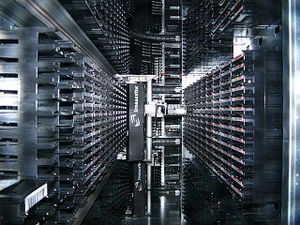Archival services: Difference between revisions
mNo edit summary |
mNo edit summary |
||
| Line 1: | Line 1: | ||
The development of large scale archive services is underway. [[File:320px-Storagetek-tape_drive_hg.jpg|border|right|300px|caption]] Within the coming years it is planned to enhance the LSDF with: |
The development of large scale archive services is underway. [[File:320px-Storagetek-tape_drive_hg.jpg|border|right|300px|caption]] Within the coming years it is planned to enhance the LSDF with: |
||
* An Easy-to-use interface for deposit and update |
* An Easy-to-use interface for deposit and update |
||
* Access to files via persistent URLs. Collections can be openly accessible or available to |
* Access to files via persistent URLs. Collections can be openly accessible or available to depositors only. |
||
* Support for specific file types and raw data |
* Support for specific file types and raw data |
||
* Permanent storage with tools for long-term management |
* Permanent storage with tools for long-term management |
||
Revision as of 16:55, 18 September 2014
The development of large scale archive services is underway.
Within the coming years it is planned to enhance the LSDF with:
- An Easy-to-use interface for deposit and update
- Access to files via persistent URLs. Collections can be openly accessible or available to depositors only.
- Support for specific file types and raw data
- Permanent storage with tools for long-term management
Service components
At first the LSDF Archive Service on Tape (LAST) offers bit stream preservation. This form of preservation is concerned with the maintenance of existing manifestations of a digital resource. Its function is to ensure the continuing integrity of, and controlled access to, the digital objects which are contained within the LSDF storage environment, including their associated metadata. It is sometimes referred to as passive preservation contrary to the “content preservation”.
We will make sure that your information is accessible only to those authorized to have access and is that it is protected throughout its lifecycle. Furthermore integrity checks will ensure that data is complete and unaltered [ISO/DIS 13008 – ISO 15489-1:2001]
Archival Projects
Several projects have started to make this happen. Research for large scale data management at KIT is contributing to the development of efficient and secure long time storage of petabytes of data. In the programme Supercomputing and Big Data of the Helmholtz Association the close collaboration with a multiple scientific communities resulted in clear requirements for future data management including the need to archive big datasets along with tools for provenance and curation. The archival projects at KIT strive to offer a reliable, dependable and above all easy to use service for scientists.
- bwDataArchiv - long time storage infrastructure for Baden-Wuerttemberg
- RADAR - archival service for the long tail of scientific data
- bwDataDiss - service for scientific data from publications. coming soon!
Research and development
What else? The long-term vision is a standardization of preservation services and their application programming interfaces (APIs). The implementation of these services is not ready but many such services, or component services which can be brought together to produce the required results, already exist at the LSDF.
In addition we seek to guarantee that trust in the quality of the services is quantified using reproducible preservation metrics.
Please turn back to this page for regular updates
(last edit 19.02.2014)
